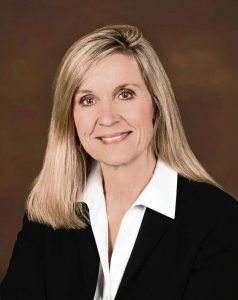For the three candidates running to represent District 4 on the Greenwood Common Council, the same issues rise to the top of concerns facing the city — public safety, infrastructure and growth.
Each candidate has different ideas to address those.
Incumbent Ron Bates has served on the Greenwood council since 2003, and is seeking his sixth term. Hoping to unseat him are two political newcomers, Teri Manship, a director and teacher at Knightsbridge Academy, and Robert “Bob” Lynn, who is retired from a career in financial management.
District 4 is Greenwood’s most developed district, serving the northwest corner of the city, from U.S. 31 to State Road 135, and from Main Street to the county line. Only residents living within those boundaries will get to vote in this race.
Whoever wins in May will face Democrat Nathan Cardenas, who is unopposed in the primary election.
To help voters make their decision in the District 4 city council race, the Daily Journal asked the candidates their takes on issues facing the city.
Here’s what they said, edited for length and clarity:
What made you want to run for this office?

Bates: I enjoy it. It’s a privilege to serve fellow citizens, and when I have been reelected in the past, it’s always a humbling experience. When you have your fellow citizens who support you and vote for you and want you to be their representative on the council, it’s always a privilege and an honor to do so.
Lynn: I’m not a politician, I never wanted to be a politician, but I’m concerned about the direction of the city. It seems like the issues that were prevalent four years ago are still on the board. From my discussions with people, nothing has been resolved, and some things have gotten worse. This is my opportunity to get involved and make some changes. It does seem like the elections in Greenwood are being more contested than ever, which means people want change. I this is an opportunity to be part of that change.
Manship: I have been a teacher at Greenwood Middle School since 2006. As I watched my children — and I do consider my students my children — all leave Greenwood to go to trade school or college or to take a break for a while, I found that they weren’t coming back. The attraction wasn’t here, and I couldn’t understand why. Once I had conversations with the kids, I realized the jobs weren’t here. What they needed and were looking for as young 20-something people wasn’t here in Greenwood. The reason I’m running is because I want to leave Greenwood a better place than I inherited. I’ve lived here since 1970, and I just want to see people want to be in Greenwood again.
What are the most pressing issues facing the city?
Bates: Obviously, it’s a combination of things. Gridlock, as it applies to our arterial streets. Certainly, we need to look at that in the near future. For example, Fry Road, we’ve heard for years and years we need to get that widened, to get a middle lane and straighten out that dogleg there before it gets to (State Road) 135. But we’ve not done anything to that. Perhaps we’ve helped a little with roundabouts, but there are some people who don’t like roundabouts.
I think in terms of fire and police, certainly that needs to be the most important function of a local government. I’ve had the privilege and honor of being endorsed by the police in the election process, and their biggest beef is they don’t feel they’ve had a say-so, a voice at the table. I’d like to continue being a voice for them.

Lynn: This isn’t just from me. While I may agree with some of these, this is a representative position, so I want to put out there what I’m hearing are the concerns. The first one is the public safety factor. I’m not going to say things are good or bad. I think the perception is there that things are not going as they should for this city. There is a dispute about facts and figures — is the crime rate going up? What parts of crime are impacting people. I think there’s some frustration there as to how it’s perceived. Overall, there is no transparency in it. It’s either going down or there’s no movement in it, but there’s the perception that it’s high and it needs to change.
People feel left out of the process. I know it’s very difficult for someone to march into city hall during a meeting and say, “I have this grievance,” to provide an outlet for those people, that’s one of my big things. People are saying I want to see my elected official coming around talking to me, or seeking my input.
Manship: Really, my priorities would be bringing the city back to life. I don’t know a better way to say that. Old Town Greenwood, to see what it’s done in the past decade, it’s brought a renaissance to the city with the revival. Everyone wants to live in Old Town Greenwood now, where 10, 15 years ago, it wasn’t like that. I like seeing that Greenwood is a place people want to be. The trails, the downtown sidewalks, all of those improvements are making the city more desirable.
I’m a child-centered person, and to see them build our city back to where these young families want to raise their children — that’s my priority. I want to continue that. I know people are fearful of it being a big city, but I don’t think Greenwood will ever be that. I just want it to have its charm, which it does again. It has that same charm it did when I was a little girl growing up in Greenwood.
What should the city council do to address public safety?
Bates: I’ve always insisted on balanced budgets, and the administration has always been good. Where I think the administration could do better is allocate more for public safety. That’s where fire and police have a legitimate concern; I don’t think they’re being staffed the way they need to be. Crime is an issue, that’s nationwide, not just our city. But the last three years, we’ve had some horrendous situations that have taken place, with the mall and whatnot. We need more police. We need more police on the street. We need more firefighters, for that first line of protection. Anything I can do as a councilor, in funding or whatnot, I’m going to support.
Lynn: Knowing what’s the benchmark — where are we, and what are the issues? Greenwood is kind of unique; we’re a suburban community, but we’re close to Indianapolis for spillover. Off-hand, I don’t have a recommendation. I’d like to look. I know different places in the country have gone through the same thing, and they’ve done different policing and different methods of reducing the crime rate. Those things need to be studied and pick out what’s applicable to Greenwood. I don’t want to put a Band-Aid on it. You can increase police presence, but police can’t be everywhere at all times.

Manship: Sadly, crime is on the rise everywhere; we are not unique. I think Greenwood is unique in many different ways, this is not one of them. I don’t know the answer to those things. But I can tell you I support all of our police and public safety officials, firemen included, EMTs. They work tirelessly to protect us. I want to stand by them, however that may be. The council, and the mayor, have found money in tight budgets, that money has been available and it’s funded the growth we’ve seen in the police and fire departments. How that looks from here on in, I don’t know.
How should Greenwood approach growth?
Bates: I’m concerned about future growth. I don’t want it to just be apartments and warehouses. I think we need a lot more single-family residences because they’re the ones who are the backbone of the city government. They’re the ones who pay the taxes, they’re the ones who support of local schools. That should be a priority, because we don’t have a lot of room as far as future growth is concerned. I don’t think we need more warehouses, I don’t think we need more apartments.
Lynn: I’m all for growth, but I don’t think it’s been controlled enough. In discussions at the council meetings, there’s a lot of banter back and forth on if this is good or bad, but I’ve never heard a study done on the long-term impacts. We’re going to put a subdivision here, and that’s great, we’re getting more people and it’s a nice subdivision. But there is very little talk on how that affects public safety, how that affects fire districts, the road conditions … We just throw another addition in there because it’s going to bring in more tax base.
Manship: The growth of the city has brought a lot of really good jobs to Greenwood. I love that I have students coming back working at some of the corporations. I’d love to see more businesses come to the city. Growth is great as long as it’s done with responsibility. I’m very conservative, so responsible spending, a balanced budget, keeping public safety personnel, that all has to be in mind each time that growth is evaluated. Greenwood is growing. We need to keep what we know and keep what we love here foremost.
What can the city council do to help infrastructure keep pace with the city’s rapid growth?
Bates: We have different departments to address that. For example, I’ve asked the sanitation department to come to the next council meeting to give a report. The best way to address it is to come to the council chambers during a council meeting, ask about these issues and try to get some resolution and answers, about what our future plan is. Looking at the city as a whole, sometimes I’m the last to know about things. Having different departments that deal with different issues. If I get enough feedback from enough people, I can bring that in front of the council and make it an item to put on future agendas, address those issues and figure out how to get the funding for that.
Lynn: You can’t just look at what’s going to happen tomorrow. You have to go down the road several years to make sure we’re accounting for those things. Even in the switches in population, families in schools and how they’re affected. I think you have to look at the long-term, do a cost-benefit analysis. You have to have more facts and figures to make these decisions. Sometimes, you have to say no, we can’t support this at this time. You have to plan for it, and if it doesn’t fit and it’s not controlled, you have to say no.
Manship: That’s a top priority. I know there have been a few projects that have been slowed down or halted or done in increments due to supply issues, or trying to keep patterns of traffic flowing the best way they can. We have to go about fixing (roads) responsibly, and hopefully each time it comes to the council, those will be weighed in the way they’re needed in the city. The council can look at each individual project and prioritize with financial responsibility what has to be done.
How do you feel about additional development of warehouses, logistics and manufacturing facilities in the city?
Bates: I think we have enough warehouses. I think we have enough apartments. What we need to focus on for future development, because we don’t have a lot of room to grow, is the single-family residences. Warehouses can provide jobs, I understand that, but I think we have enough. I don’t know if we want to put a moratorium on that or not. If I was the administration, and I was the mayor, I wouldn’t want that to be my legacy. Not that the mayor hasn’t done some things to identify with.
Lynn: I would prefer other businesses. While warehouses bring in a short-term boost — I know they bring in a lot of tax revenue — but as a long-term business plan, I don’t think that’s the most advantageous. I’d like to see recruitment for other, more long-term businesses come into the city. We’re putting a lot on the east side, and there are a lot of residential areas there. It gets a lot of complaints, not just from aesthetics, but from safety of children and traffic. It’s one of those things that’s inevitable, but it needs to be controlled.
Manship: I can tell you, none of us want that in our backyard. I understand that completely. It does bring jobs to the city, and that’s what we want. It adds to our tax base. Do I want any more? I’m going to be honest, I hope that side slows down. It needs to be taken case by case and looked at with responsibility. Our constituents, what do they want? I don’t know that I’d like to look out my backyard and look at that, but again, checks and balances, we have to look at what is best for the city, and I think the council has done an outstanding job on that to this point.
How should tax abatements be used by the city?
Bates: I’ve generally been for tax abatements, if whoever it may be has the funding as well. I’m not for speculative tax abatements, there’s so much ambiguity in that. I’ve never been a fan and never supported tax abatements for speculative buildings. But if it’s a tax abatement for a reputable business, I’m for that. It’s a win-win. Give them a little break up front to get started.
Lynn: The city should use these with caution. Being a tool to be used to attract business, abatements should be used when normal means of securing a new business is not successful. And the cost incurred by the city to service that business needs to be weighed against the benefits of bringing in that business — jobs, high salary for employees, etc. There needs to be a defined benefit before agreeing to any form of abatement. There also must be a penalty of noncompliance if the business fails to meet the expectation outlined in the agreement. Whether that is termination of the abatement (permanently or temporary) it needs to be strictly enforced. Tax dollars are at risk here and need to be protected to the fullest by the city.
Manship: I’ve had that question asked to me a number of times because people don’t understand them. I don’t think they’re for or against them, I just don’t think they understand them. I’m sure I’ll have a better understanding as soon as I’m in there doing work for the city if I have that honor. To attract businesses to the city by using an abatement, that’s used in a lot of communities, We still collect money, and collecting money is better than not if that property should be sitting empty. Endress+Hauser is a great example of using an abatement. They’re bringing many high-paying jobs to the city, they have a beautiful facility.
THE BATES FILE
Name: Ron Bates
Party: Republican
Age: 75
Family: Wife Donna; four adult children
Occupation: Educator at Suburban Christian School
Education: Ross High School, Missouri; Tennessee Temple University bachelor’s; Tri-City Bible College, master’s; Maranatha Baptist University, history graduate certificate
Political experience: Greenwood City Council member since 2004
Memberships: Suburban Baptist Church; Johnson County Women’s Republican Club
THE LYNN FILE
Name: Robert (Bob) Lynn
Party: Republican
Age: Not given
Family: Wife Judy; two children
Occupation: Retired; previously worked in financial management
Education: Andrean High School, Merrillville; Indiana University bachelor’s
Political experience: None
Memberships: Healthcare Financial Management Association; 25 years of community service as a reserve police officer
THE MANSHIP FILE
Name: Teri Manship
Party: Republican
Age: 62
Family: Husband Cory; three sons
Occupation: Director and teacher at Knightsbridge Academy
Education: Center Grove High School; Ball State University bachelor’s; Indiana University master’s in education
Political experience: None
Memberships: Volunteer at Riley Hospital for Children at IU Health, The Impact Center and The Refuge Center
ABOUT THE JOB
What: Greenwood City Council District 4
District 1: Represents northwest corner of the city, from U.S. 31 to State Road 135, and from Main Street to the county line.
Term: Four years
Pay: $13,058.98 a year (2023)
Duties: Set annual spending for the city, make policy changes, adopt new local rules and ordinances, approve new taxes, appoint members to various city boards.




